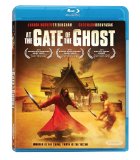| Reviews & Columns |
|
Reviews DVD TV on DVD Blu-ray 4K UHD International DVDs In Theaters Reviews by Studio Video Games Features Collector Series DVDs Easter Egg Database Interviews DVD Talk Radio Feature Articles Columns Anime Talk DVD Savant Horror DVDs The M.O.D. Squad Art House HD Talk Silent DVD
|
DVD Talk Forum |
|
|
| Resources |
|
DVD Price Search Customer Service #'s RCE Info Links |
|
Columns
|
|
|
At the Gate of the Ghost
Magnolia Home Entertainment // R // April 16, 2013
List Price: $29.98 [Buy now and save at Amazon]
The Film:
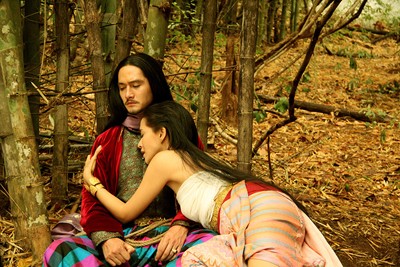 Remakes can be tricky business: should they stay true to the source out of respect and diligence towards theme preservation, or should they attempt to adjust the story's context and visual tone to achieve something both similar and noticeably unique? It's even tougher to land on an answer to that with iconic cinema such as Akira Kurosawa's oeuvre; arguably the most successful reimaginings of his work break away from overt similarities to the source, such as The Magnificent Seven and Last Man Standing. At the Gate of the Ghost -- aptly titled The Outrage in its native Thailand -- attempts an almost precise duplication of Rashomon, from the way the characters look and act down to its strict philosophical ideas about human dishonesty and perspective. Despite justifiable performances and a lush visual tone, such a literal replica of a classic masterwork doesn't really give itself a reason for existing, and the film's few minuscule changes are either heavy-handed or redundantly articulate what's already said on a nonverbal level.
Remakes can be tricky business: should they stay true to the source out of respect and diligence towards theme preservation, or should they attempt to adjust the story's context and visual tone to achieve something both similar and noticeably unique? It's even tougher to land on an answer to that with iconic cinema such as Akira Kurosawa's oeuvre; arguably the most successful reimaginings of his work break away from overt similarities to the source, such as The Magnificent Seven and Last Man Standing. At the Gate of the Ghost -- aptly titled The Outrage in its native Thailand -- attempts an almost precise duplication of Rashomon, from the way the characters look and act down to its strict philosophical ideas about human dishonesty and perspective. Despite justifiable performances and a lush visual tone, such a literal replica of a classic masterwork doesn't really give itself a reason for existing, and the film's few minuscule changes are either heavy-handed or redundantly articulate what's already said on a nonverbal level.
The only thing differentiating M.L. Bhandervanop Devakul's adaptation from its source is the more direct Buddhist angle that frames it, as well as a clearer emphasis on the importance of those telling the story of dishonesty and deceit in a murder trial. Seeking shelter in the midst of torrential rainfall, a devout monk (Mario Maurer) and a common woodcutter (Petchtai Wongkamlao) sit around a campfire as they contemplate the wrongs of the world and how it pertains to offset "dharma", their minds lingering on testimonies they had recently heard about the killing. Later joined by a vagabond "undertaker" (Pongpat Wachirabunjong) who offers a pragmatic, unsavory point of view to their idealistic concerns, they all retrace the testimonies of three people in the case of a warlord's murder: the words of a famous bandit (Dom Hetrakul) charged with the death, of the dutiful widow (Chermarn Boonyasak), and an of the warlord himself (Ananda Mathew Everingham). The story is a straightforward exploration of culling falsities from truth, and vice versa, until their conflicting points-of-view -- and their interpretations of one another -- are called into action.
Rashomon strikes a balance between the characters' perspectives and whether the real focus is the testimony's subjects or those telling their stories, something At the Gate of the Ghost loses by shining a spotlight on the conflicted monk. Beginning with a grandiose, heavy illustration of a young boy's development from a common child to a devout Buddhist, the tone crafted here is one of a religious man finding his way back to the right caliber and focus of his belief structure through his societal comprehension -- and how murder, deceit, and selfishness weaken his resolve. While it doesn't necessarily take away from the intentions of Kurosawa's original film, it does add a slant to its tone that limits effectiveness on a wider scale; believers and non-believers can both appreciate the gray-area morality in the original, while intentionally filtering that through the eyes of a monk adds something else to the equation. Since that's where most of the added content comes from, it's a weaker and more narrow-focused film for it.
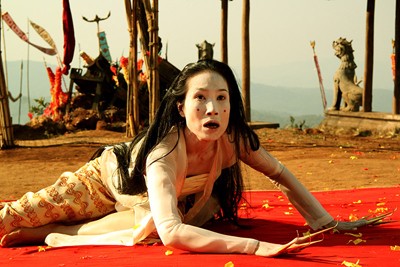 Aside from that, At the Gate of the Ghost essentially plays out as a verbatim, colorful reenactment of Kurosawa's film once it gets all the philosophical debaters
Aside from that, At the Gate of the Ghost essentially plays out as a verbatim, colorful reenactment of Kurosawa's film once it gets all the philosophical debaters under the same roof in the same cavern for their campfire storytelling, each yarn crafted with easily admirable passion and visual grandeur. Choreographed sword battles and a shifting gradient of pain and anger in the tied-up warlord's disposition are beautiful in their familiarity, while there's a stunning scene involving a shaman channeling a spirit from the afterlife, her black teeth and long-curled nails creating an striking display of mysticism. Director M.L. Bhandervanop Devakul achieves many the same takeaway points -- numerous versions of the same people in different contexts, unreliable narration, biased motivations, constant variables -- all cradled in Thailand's opulent settings of cascading waterfalls and convoluted forests. And while there's a lack of dimension to the performance, the cast suitably acts out their respective roles in the varied recounts: some selfish, some noble, some cunning, some affable.
Unfortunately, the variation of the "crime scenes" emphasizes each version of the murder being a "completely different story" a little to on-the-nose, since they lack the ability to truly express that there could be other truths hidden among the testimonials. Each recount in At the Gate of the Ghost is too disparate, too black-and-white, reaching a point where the best course of action is to dismiss almost all viewpoints as unreliable (aside from one, small fact) instead of a sliding scale of integrity, something counterproductive to what the film aims to accomplish. What's really frustrating about this, as the film moves along, is its fondness for verbalizing aloud what simple interpretation gets across in Kurosawa's original, forcing it into a corner of tiring existential clarification that makes the story appear less intellectually engaging. This might seem like splitting hairs when comparing the two, especially when they're seventy (70!) years apart, but when films are this similar outside of some tricky alterations, it's hard to overlook those issues when digging into a revitalization of one of cinema's great critiques on perspective.
The Blu-ray:
Video and Audio:
The biggest asset At the Gate of the Ghost has going for it is the exceptional cinematography capturing the lush Thailand locales, so it's a good thing that Magnolia Home Entertainment's 2.35:1-framed 1080p AVC treatment handles the vibrant color and complex outdoor textures with a steady hand. And make no mistake, there's a lot of beauty to be found here: twisted branches in expansive forests roads, weather-beaten rocks alongside waterfalls, and the sprawling horizon behind the outdoor court are capably presented. There are a few issues to be found, namely some peculiar details smoothness and color blocking that likely aren't the intention of the cinematography, but it's mostly a robust presentation that nails the crispness in close-ups and vibrant palette choices in garments.
The Thai 5.1 Master Audio track is clear and stable, but an utterly forgettable treatment that has next to no standout moments. Clanking of sword blades and the cascade of water offer a few engaging sound elements, which do move into the surround channels for fleeting moments for a fine immersive effect, while the echo of dialogue in the cavern does provide a rather nice dimension of ambience when listening to the trio of "philosophers" debate. And the scene involving the shaman in court does get the sound design's mojo going a bit, where wisps of ambience and the rumble of a spectral voice can be engaging. Everything else, though, is suitably clear, natural, and supportive of the film's intents, just ... without much to really take away. The English subtitle translation is also quite good.
Special Features:
A few standard featurettes have been included with At the Gate of the Ghost: a quick making-of slate entitled The Making of a Legendary Story (7:16, 4x3 SD), which mixes interviews, behind-the-scenes shots, and clips from the film for a generic press-kit reel; and an even quicker Behind The Scenes (4:14, 4x3 SD) glimpse that offers a few shots of more literal film construction footage. An International Trailer (2:13, HD) rounds out the available supplements.
Final Thoughts:
It'll all depend on your view of remakes whether At the Gate of the Ghost will be worth checking out. In terms of textual reverence to the source, it's hard to imagine a more to-the-bone contemporary replication of the story made famous by Akira Kurosawa's film; the actors' presences, the visual tempo, and the way the events play out are all quite faithful. The problem is that it's all a little too faithful, too by-the-book and insistent on getting the same points and perspective across, that it's given very little room to become its own film -- outside of the added emphasis on the wavering Buddhist monk. Seeing the story filtered through lush Thailand visuals and suitable filmmaking might make this worth a Rental, especially the appealingly-rendered Blu-ray. But, really, I'd recommend just sticking with the original.
Thomas Spurlin, Staff Reviewer -- DVDTalk Reviews | Personal Blog/Site
 Remakes can be tricky business: should they stay true to the source out of respect and diligence towards theme preservation, or should they attempt to adjust the story's context and visual tone to achieve something both similar and noticeably unique? It's even tougher to land on an answer to that with iconic cinema such as Akira Kurosawa's oeuvre; arguably the most successful reimaginings of his work break away from overt similarities to the source, such as The Magnificent Seven and Last Man Standing. At the Gate of the Ghost -- aptly titled The Outrage in its native Thailand -- attempts an almost precise duplication of Rashomon, from the way the characters look and act down to its strict philosophical ideas about human dishonesty and perspective. Despite justifiable performances and a lush visual tone, such a literal replica of a classic masterwork doesn't really give itself a reason for existing, and the film's few minuscule changes are either heavy-handed or redundantly articulate what's already said on a nonverbal level.
Remakes can be tricky business: should they stay true to the source out of respect and diligence towards theme preservation, or should they attempt to adjust the story's context and visual tone to achieve something both similar and noticeably unique? It's even tougher to land on an answer to that with iconic cinema such as Akira Kurosawa's oeuvre; arguably the most successful reimaginings of his work break away from overt similarities to the source, such as The Magnificent Seven and Last Man Standing. At the Gate of the Ghost -- aptly titled The Outrage in its native Thailand -- attempts an almost precise duplication of Rashomon, from the way the characters look and act down to its strict philosophical ideas about human dishonesty and perspective. Despite justifiable performances and a lush visual tone, such a literal replica of a classic masterwork doesn't really give itself a reason for existing, and the film's few minuscule changes are either heavy-handed or redundantly articulate what's already said on a nonverbal level. The only thing differentiating M.L. Bhandervanop Devakul's adaptation from its source is the more direct Buddhist angle that frames it, as well as a clearer emphasis on the importance of those telling the story of dishonesty and deceit in a murder trial. Seeking shelter in the midst of torrential rainfall, a devout monk (Mario Maurer) and a common woodcutter (Petchtai Wongkamlao) sit around a campfire as they contemplate the wrongs of the world and how it pertains to offset "dharma", their minds lingering on testimonies they had recently heard about the killing. Later joined by a vagabond "undertaker" (Pongpat Wachirabunjong) who offers a pragmatic, unsavory point of view to their idealistic concerns, they all retrace the testimonies of three people in the case of a warlord's murder: the words of a famous bandit (Dom Hetrakul) charged with the death, of the dutiful widow (Chermarn Boonyasak), and an of the warlord himself (Ananda Mathew Everingham). The story is a straightforward exploration of culling falsities from truth, and vice versa, until their conflicting points-of-view -- and their interpretations of one another -- are called into action.
Rashomon strikes a balance between the characters' perspectives and whether the real focus is the testimony's subjects or those telling their stories, something At the Gate of the Ghost loses by shining a spotlight on the conflicted monk. Beginning with a grandiose, heavy illustration of a young boy's development from a common child to a devout Buddhist, the tone crafted here is one of a religious man finding his way back to the right caliber and focus of his belief structure through his societal comprehension -- and how murder, deceit, and selfishness weaken his resolve. While it doesn't necessarily take away from the intentions of Kurosawa's original film, it does add a slant to its tone that limits effectiveness on a wider scale; believers and non-believers can both appreciate the gray-area morality in the original, while intentionally filtering that through the eyes of a monk adds something else to the equation. Since that's where most of the added content comes from, it's a weaker and more narrow-focused film for it.
 Aside from that, At the Gate of the Ghost essentially plays out as a verbatim, colorful reenactment of Kurosawa's film once it gets all the philosophical debaters
Aside from that, At the Gate of the Ghost essentially plays out as a verbatim, colorful reenactment of Kurosawa's film once it gets all the philosophical debaters Unfortunately, the variation of the "crime scenes" emphasizes each version of the murder being a "completely different story" a little to on-the-nose, since they lack the ability to truly express that there could be other truths hidden among the testimonials. Each recount in At the Gate of the Ghost is too disparate, too black-and-white, reaching a point where the best course of action is to dismiss almost all viewpoints as unreliable (aside from one, small fact) instead of a sliding scale of integrity, something counterproductive to what the film aims to accomplish. What's really frustrating about this, as the film moves along, is its fondness for verbalizing aloud what simple interpretation gets across in Kurosawa's original, forcing it into a corner of tiring existential clarification that makes the story appear less intellectually engaging. This might seem like splitting hairs when comparing the two, especially when they're seventy (70!) years apart, but when films are this similar outside of some tricky alterations, it's hard to overlook those issues when digging into a revitalization of one of cinema's great critiques on perspective.
The Blu-ray:
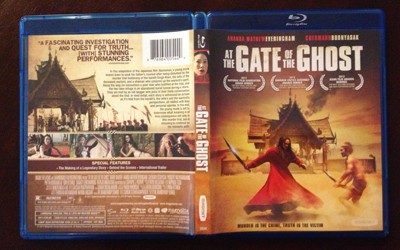 | 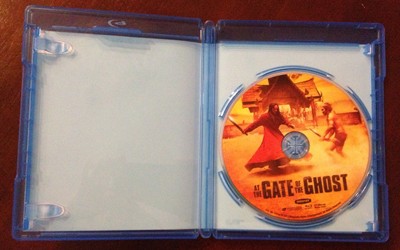 |
Video and Audio:
The biggest asset At the Gate of the Ghost has going for it is the exceptional cinematography capturing the lush Thailand locales, so it's a good thing that Magnolia Home Entertainment's 2.35:1-framed 1080p AVC treatment handles the vibrant color and complex outdoor textures with a steady hand. And make no mistake, there's a lot of beauty to be found here: twisted branches in expansive forests roads, weather-beaten rocks alongside waterfalls, and the sprawling horizon behind the outdoor court are capably presented. There are a few issues to be found, namely some peculiar details smoothness and color blocking that likely aren't the intention of the cinematography, but it's mostly a robust presentation that nails the crispness in close-ups and vibrant palette choices in garments.
The Thai 5.1 Master Audio track is clear and stable, but an utterly forgettable treatment that has next to no standout moments. Clanking of sword blades and the cascade of water offer a few engaging sound elements, which do move into the surround channels for fleeting moments for a fine immersive effect, while the echo of dialogue in the cavern does provide a rather nice dimension of ambience when listening to the trio of "philosophers" debate. And the scene involving the shaman in court does get the sound design's mojo going a bit, where wisps of ambience and the rumble of a spectral voice can be engaging. Everything else, though, is suitably clear, natural, and supportive of the film's intents, just ... without much to really take away. The English subtitle translation is also quite good.
Special Features:
A few standard featurettes have been included with At the Gate of the Ghost: a quick making-of slate entitled The Making of a Legendary Story (7:16, 4x3 SD), which mixes interviews, behind-the-scenes shots, and clips from the film for a generic press-kit reel; and an even quicker Behind The Scenes (4:14, 4x3 SD) glimpse that offers a few shots of more literal film construction footage. An International Trailer (2:13, HD) rounds out the available supplements.
Final Thoughts:
It'll all depend on your view of remakes whether At the Gate of the Ghost will be worth checking out. In terms of textual reverence to the source, it's hard to imagine a more to-the-bone contemporary replication of the story made famous by Akira Kurosawa's film; the actors' presences, the visual tempo, and the way the events play out are all quite faithful. The problem is that it's all a little too faithful, too by-the-book and insistent on getting the same points and perspective across, that it's given very little room to become its own film -- outside of the added emphasis on the wavering Buddhist monk. Seeing the story filtered through lush Thailand visuals and suitable filmmaking might make this worth a Rental, especially the appealingly-rendered Blu-ray. But, really, I'd recommend just sticking with the original.
|
| Popular Reviews |
| Sponsored Links |
|
|
| Sponsored Links |
|
|
| Release List | Reviews | Shop | Newsletter | Forum | DVD Giveaways | Blu-Ray | Advertise |
|
Copyright 2024 DVDTalk.com All Rights Reserved. Legal Info, Privacy Policy, Terms of Use,
Manage Preferences,
Your Privacy Choices | |||||||









